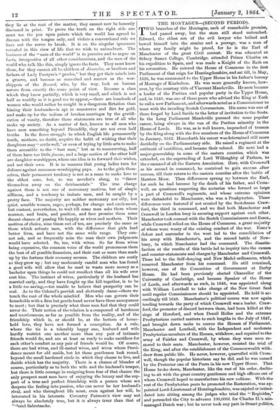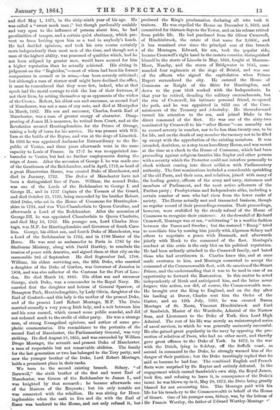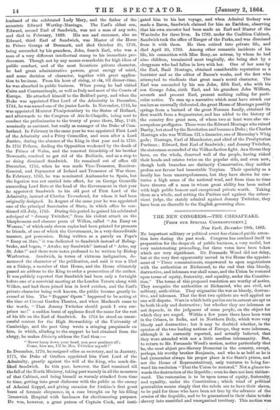THE MO N TAGUS—(SECOND PERIOD).
rpwo branches of the Montages, each of remarkable promise, We turn to the second existing branch. Sidney, " of Barnwell," the sixth brother of the first and worst Earl of Manchester, was Groom of the Bedchamber to James I., and was knighted by that monarch ; he became afterwards one of the Masters of the Requests ; but his only notable act was connected with the rebellion. He was sitting for Hunt- ingdonshire when the oath to live and die with the Earl of Essex was tendered to the House, and not only refused it, but husband of the celebrated Lady Mary, and the father of the eccentric Edward Wortley-Montagu. The Earl's eldest son, Edward, second Earl of Sandwich, was not a man of any note, and died in February, 1689. His son and successor, also an Edward, third Earl of Sandwich, was Master of the Horse to Prince George of Denmark, and died October 20, 1729, being succeeded by his grandson, John, fourth Earl,. who was a man of a very different intellectual stamp to his immediate pre- decessors. Though not by any means remarkable for high ideas of public conduct, and of the most licentious private character, he had great administrative powers, great energy of mind, and some decision of character, together with great applica- tion to business. From his hour of rising, at six, till dinner-time, he was absorbed in public business. When young he had visited Cairo and Constantinople, as well as Italy and most of the Courts of Europe. He attached himself to the Bedford party, and when the Duke was appointed First Lord of the Admiralty in December, 1744, he was named one of the junior Lords. In November, 1746, he was appointed Minister Plenipotentiary to the States of Holland, and afterwards to the Congress of Aix-le-Chapelle, being sent to conduct the preliminaries to the treaty of peace there, May, 1748, nominally as assistant, but really as manager of the Duke of Cum- berland. In February in the same year he was appointed First Lord of the Admiralty and a Privy Councillor, and soon after a Lord Justice, during the absence of the King in that year and in 1750. In 1751 Pelham, finding the Opposition weakened by the death of the Prince of Wales, and the renewed friendship of his brother Newcastle, resolved to get rid of the Bedfords, and as a step to so doing dismissed Sandwich. He remained out of office till December, 1755, when he was made Vice-Treasurer, Receiver- General, and Paymaster of Ireland and Treasurer of War there. In February, 1763, he was nominated Ambassador to Spain, but the legation was not carried into effect, for on George Grenville succeeding Lord Bute at the head of the Government in that year he appointed Sandwich to his old post of First Lord of the Admiralty, instead of Charles Townshend, for whom it had been originally designed. In August of the same year he was appointed one of the principal Secretaries of State, in which office he con- tinued till July, 1765. During this period he gained his celebrated sobriquet of "Jemmy Twitcher," from his violent attack on the blasphemous and obscene poem of Wilkes, called " An Essay on Woman," of which only eleven copies had been printed for presents to friends, of one of which the Government, in a very discreditable manner, got possession. Being written as a parody on Pope's " Essay on Man," it was dedicated to Sandwich instead of Boling- broke, and began, " Awake. my Sandwich!" instead of " Arise, my St. John !" and there were notes professed to be written by Bishop Warburton. Sandwich, in terms of virtuous indignation, de- nounced the character of the publication, and said it was a libel on a Bishop, a member of that House, and the House ultimately .passed an address to the King to order a prosecution of the author. It was publicly reported that Sandwich had been only a fortnight before one of a convivial meeting at the London Tavern along with Wilkes, and had there joined him in lewd catches, and the Earl's private character being well known, the public became greatly in- censed at him. The " Beggars' Opera" happened to be acting at the time at Covent Garden Theatre, and when Macheath came to the words, " That Jemmy Twitcher should peach I own sur- prises me !" a sudden burst of applause fixed the name for the rest of his life on the Earl of Sandwich. In 1764 he stood an unsuc- cessful contest for the High Stewardship of the University of Cambridge, and the poet Gray wrote a stinging pasquinade on him, in which, alluding to the support he had obtained from the clergy, he makes Divinity address the Earl thus :— " Never hang down your head, you poor penitent elf ;
Come, kiss me, I'll be Mrs. Twitcher myself !"
In December, 1770, he resigned office as secretary, and in January, 1771, the Duke of Grafton appointed him First Lord of the Admiralty, greatly against the will of the King, who much dis- liked Sandwich. In this post, however, the Earl remained till the fall of the North Ministry, taking part warmly in all the measures of that Cabinet, and being himself as warmly attacked from time to time, getting into great disfavour with the public as the enemy of Admiral Keppel, and giving occasion for Erskine's first great burst of forensic eloquence, in a case brought on by his filling Greenwich Hospital with landsmen for electioneering purposes. He was, however, a great patron of Captain Cook, and insti-
gated him to his last voyage, and when Admiral Rodney was made a Baron, Sandwich claimed for him an Earldom, observing that his own ancestor had been made an Earl and Master of the Wardrobe for three lives. In 1783, under the Coalition Cabinet, Sandwich took the office of Ranger of the Parks, and was dismissed from it with them. He then retired into private life, and died April 30, 1792. Among other romantic incidents of his life, his connection with Miss Reay, an actress, by whom he had nine children, terminated most tragically, she being shot by a clergyman who had fallen in love with her. One of her sons by the Earl, Basil Montagu, obtained considerable reputation as a barrister and as the editor of Bacon's works, and the first who attempted to vindicate that great man's moral character. The Earl was succeeded by his son John, fifth Earl, who with his son George John, sixth Earl, and his grandson John William, seventh and present Earl, present nothing calling for parti- cular notice. To sum up a narrative which must have struck our readers as unusually dislocated, the great House of Montagu possibly springs from a bastard of the great Norman family, obtained its first wealth from a Sequestrator, and has added to the history of the country five great men, of whom two at least were also un- scrupulous profligates. These were the Edward Montagu who ruined Danby, but stood by the Revolution and became a Duke ; the Charles Montagu who was William M.'s financier, one of Macaulay's Whig gods ; Montagu, Earl of Manchester, and chief of the Presbyterian Puritans ; Edward, first Earl of Sandwich ; and Jemmy Twitcher, the statesman-scoundrel of the Wilkes faction fight. As a House they have, on the whole, deserved well of the people, having risked their heads and estates twice on the popular side, and even now, though both branches are distinctly Conservative, they neither profess nor favour bad immutable Toryism. Their specialty as a family has been unscrupulousness, but they have shown for cen- turies a high sense of the national weal, and from time to time have thrown off a man in whom great ability has been united with high public honour and exceptional private worth. Taking them as a whole, and setting the Puritan earl against the subser- vient judge, the stately admiral against Jemmy Twitcher, they have been.no discredit to the English governing class.


















































 Previous page
Previous page